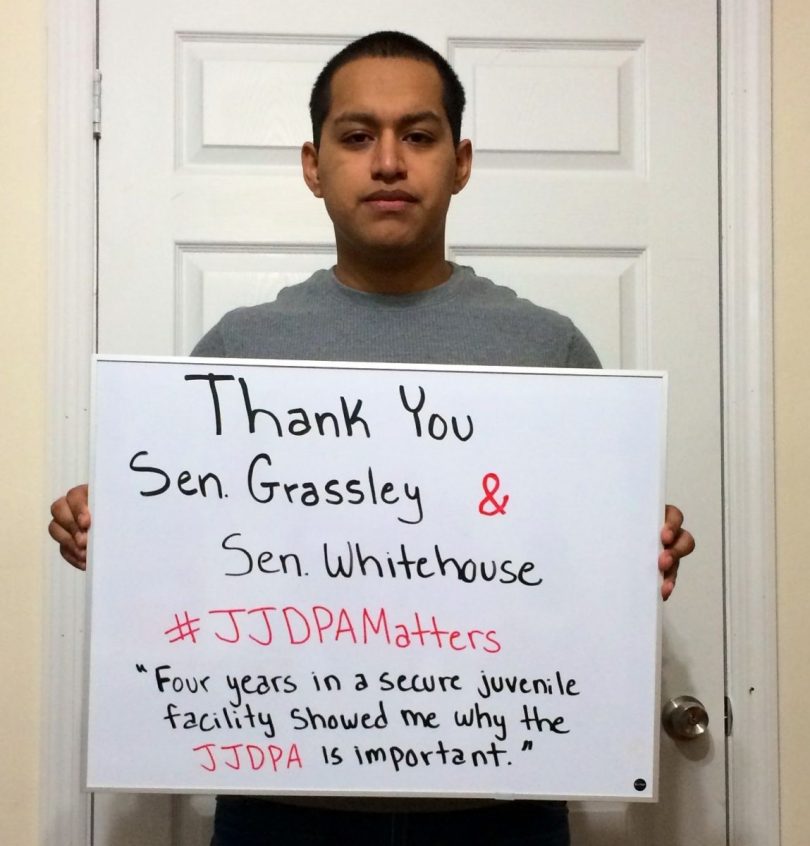The Juvenile Justice and Delinquency Prevention Act Moves Toward Reauthorization—But There’s a Catch
by Bill Myers
Juvenile justice reform advocates are turning their attention to a House and Senate conference committee after a key bill, a decade-plus in the making, passed yet another legislative hurdle.
The Senate passed a reauthorization of the Juvenile Justice and Delinquency Prevention Act (S 860) on Tuesday by a voice vote. The act hadn’t been reauthorized since 2002 and was badly in need of an update, juvenile justice advocates have long argued.
The bill now heads to a conference committee to be reconciled with its House version, HR 1809. The main difference is that the House version completely phases out 1984 provisions that allow minors to be locked up for status offenses — running away from home, skipping school, etc. The Senate kept language that would allow a minor to be locked up if his or her status offense violated a valid court order. Sen. Tom Cotton, R-Arkansas, a longtime obstacle to Senate passage, had insisted on the court order provisions.
A Reluctant Compromise
Still, with nearly 60,000 young people in juvenile facilities, many reform advocates seemed grateful just to get this far and were cautiously optimistic about final passage. “We are glad to see Congress coming together to take this important action,” said Naomi Smoot, executive director of the Coalition for Juvenile Justice, in a statement. “It is our hope that the final legislation will include a phase-out of the valid court order exception, and bring an end to the incarceration of children who are in need of services, not jail time.”
The Senate bill’s main sponsors were Chuck Grassley, R-Iowa, and Sheldon Whitehouse, D-Rhode Island. Both hailed the legislation as “a significant step” toward reform.
“Youngsters who encounter the juvenile justice system should be treated safely, fairly and in a manner that encourages greater respect for the law,” Grassley said in a statement. “The federal juvenile justice program helps states achieve these fundamental goals, but the program hasn’t been updated in more than a decade.”
In his own statement, Whitehouse said the bill “will help kids in the system to turn things around, return home, and stay out of trouble.”
“It helps to stop practices that do more harm than good, like confining young people with adults or putting them in solitary confinement,” Whitehouse added.
Among other things, the Senate bill:
*Requires states that receive federal grants to commit to “core principles,” including segregation of young detainees from adults and the identification and reduction of racial disparities in juvenile detention;
*”Encourages” authorities to be more vigilant at screening children who might have been sexually trafficked or who suffer from mental illness or drug or alcohol abuse; and
*Encourages grantees to phase out the shackling of pregnant girls, support continuing education for detainees and “promote greater separation of juvenile offenders” from adult detainees.
The legislation would set aside $159 million in federal funds for fiscal 2017, followed by a 1.5 percent increase per year through 2021.
Stalls, Status Offenses, and the Lock-Up Minded Senator Tom Cotton.
Senate passage has stalled for years, mostly over concerns about the court order exception to juvenile lockup. Cotton has long stood in the way of reauthorizations over the issue. This year, when he convinced Grassley and Whitehouse not to remove the court order exception, Kentucky Republican Sen. Rand Paul put a hold on the bill. In the end, Rand agreed to drop his objections and the legislation passed.
Some juvenile justice advocates are hopeful that the court order language will be removed in conference. The House bill would require states to phase out the exception in three years.
As it stands, half the states have either banned the practice or not made use of it. Nonetheless, more than 7,000 young people were locked up for status offenses against a valid court order in a year.
Cotton has increasingly become isolated in his opposition to waiving the court order exception. In July, the National Council of Juvenile and Family Court Judges, which successfully lobbied for the exception in the 1980s, reversed itself, saying that it now “supports the development of consultation resources for those courts that have been using the valid court order exception to guide them in reforming their policies, programs, and practices regarding youth engaged in status offense behaviors.”
Bill Myers is a veteran journalist, and investigator based in Washington D.C.
This story originally ran in the Juvenile Justice Information Exchange
Top photo courtesy of the Coalition for Juvenile Justice.


Wow, these senators are out of the LA County Loop. Please tell them to come around LA County Probation and Juvenile justice court’s. These are thing’s that are already practiced!